A group of House Republicans has begun a probe into a potential U.S. ban on fuel exports and what they called the “potential misuse” of the national strategic oil reserve by the Biden administration.
In an Oct. 26 letter to Department of Energy (DOE) Secretary Jennifer Granholm, Republican lawmakers on the House Committee on Oversight and Reform asked to examine all documents relating to deliberations on a potential oil and gas export ban they said would send fuel prices up even higher amid a global energy shortage.





